This article was originally published in the Griffon (the publication of the Iso & Bizzarrini Owner’s Club) – Volume Two, Number Three (1982). The Iso & Bizzarrini Owner’s Club (IBOC) was founded in 1980 by Winston Goodfellow and the author of this article, Louis Van den Berg who also served as the Editor and Publisher of the Griffon.
At the time this article was written all Iso GT and Bizzarrini cars were between 8 and 20 years old from new, yet they had a loyal following that needed a club and a magazine.
Let’s take a trip back in time to 1982 where much of what is written here is still relevant and we may recognize ourselves in the words of this author.
Mike Gulett, Editor
by Louis Van den Berg –
Most club members have experienced the nervous anticipation, cautious negotiation, sheer delight and painful discomfort of buying and owning Isos and/or Bizzarrinis, so most of the things contained in this article are going to be nothing new to you. I just feel that it would be good to put some of my thoughts and experiences down in writing for the benefit of those established Iso owners who can compare their experiences with mine and for the ranks. Everyone should feel free to respond to this in our “Letters” [1] forum in case I miss something, or they wish to disagree with something.
First of all, let me say that buying an Iso or Bizzarrini is an act, the motivation for which is not always entirely rational. It is so often purely emotional. Because of that, emotions often carry the buyer off into a semi-rational twilight zone that may seem to the poor chap at the time to be utterly focused. A potential buyer may see many things in his potential acquisition. Some are just dumbstruck by the sheer beauty of the cars. There is simply no denying this point–the Giugario designed Isos and Bizzarrinis are among the most lovely things ever to adorn our highways. From the flamboyant Grifo and Bizzarrini to the beautifully understated and elegant Lele [2], Rivolta GT and Fidia. They’re just fantastic looking. This was one of my primary motivations years ago when I acquired my first Iso, a Rivolta. Other buyers may have other motivations: the need to feel virile, attract ladies, pretend to be wealthy, show off the wealth that you actually have, have fun, make an investment or what-have-you. There are as many reasons as there are people.
I had been interested in cars for years, mostly non-exotics since those were the cars that were within my practical financial reach. My tastes though, even within the realm of standard mass-production cars, did tend toward the more unusual. I loved Saabs and Citroens. I still think they’re great. With all the arrogance and ignorance of youth, I turned my nose upwards at the sight, or even the thought, of a Datsun, Toyota, or any American car. American was a serious insult. Now, as an “emerging adult,” I can see that these cars have their place in practical society. They fulfill a need. They make our cars exotic. It is the rarity of our cars in the relative context of millions of mundane production cars that makes them special.
I had gone to the limits of performance in my cars and I wanted to go farther. The reasons for this “need” shall remain cloaked and shrouded in mystery, since this is certainly no forum for a psychological self-examination and may, besides, turn up hidden quirks and idiosyncrasies which the average well-balanced find loathsome (but may be perfectly understandable to true Iso enthusiasts). In any case, I began to survey the “exotic” car field. There were several parameters which I imposed on myself.
I wanted something truly special, maybe even a one-off of some sort. But it had to be good–design wise. It had to be beautiful. Many exotic cars are beautiful, but some more so than others. It didn’t necessarily have to stun the average Joe on the sidewalk, leaving them speechless and drooling, but it did have to please me to no end. I also wanted reasonable parts availability. Allow me to interject here that no exotic car is absolutely reasonable, so what I really mean is relatively reasonable. What I wanted was an Iso, but didn’t know that then. So, with these factors in mind, I went looking.
I first heard about Isos about ten years ago. I had never seen one in person, but the photos intrigued me. When I started looking for an exotic, they were in the very back of my mind. I looked first, of course, at Ferrari. I rejected the marque because it failed my criteria in several areas, especially the bit about reasonable parts and service. Besides, I really didn’t like the styling of the 330 2+2, which was the only Ferrari I could afford at the time. Ditto for the Lamborghini 350GT. I nearly went into apoplexy when a friend told me that he had purchased one for me as my agent after a ferocious bidding war. He was joking and I’m glad. I wouldn’t have liked the car. I considered many cars, but the ones I came very close to buying during this exotic odyssey were: Aston Martin DB-5, Maserati Mistral, Citroen SM, Lotus Elan +2 and Lotus Europa. Looking back, I feel I should have bought the Mistral. It was very cheap and had a lovely exhaust note, besides being quite good mechanically. But I hesitated because I really didn’t like its looks that much and someone else bought it.
Why didn’t I buy any of the others? Citroens are wonderful, but as complicated as the space shuttle. Lotus’ tend to fly apart. While I was test driving the Europa, the sun roof flew off the car with no assistance from me and was crushed by a truck on the freeway. If that’s not enough, the passenger door nearly fell off. Its mounted in fiberglass with no solid visible means of support. Things were getting desperate.
One day an advertisement appeared in the newspaper. “’67 Iso Rivolta GT 2+2, very good condition, $5,000.” I thought I should check it out. I drove for a couple of hours in my Saab and when I saw it on the street, I knew that this was it. What a unique car. Elegant lines, but quite aggressive. Fantastico! I knew I had discovered a sleeper, a car that was destined to be a great classic. (My feelings have yet to be justified, but I still feel that they will.) [3]
The guy was watering his lawn, while I was watering my mouth. “You’re the guy from Riverside, aren’t you?” “Yes,” I replied with a growing feeling of doom. “Sorry, the car’s been sold already. Guy bought it who drove up in a real nice 240Z.” He chewed and spat. “Damn,” I said under my breath. I wanted the car. Especially now, since I couldn’t have it. “Do you mind if I look at it?” I said pleadingly. Obligingly he said, “no, go right ahead.”
As I looked over the car I found many details that I liked: the seating position, dash layout, the thoughtful amenities here and there. I also liked its little peculiarities, like having two sets of horns. Loud air horns for the country when you’re traveling at 135 and there’s a farmer a mile and a half in the distance pulling a load of hay across a two lane road. Tell him to get out of the way by flipping this elegant little switch and using the air horns. On the other hand, when indulging in a bit of La Dolce Vita on the stradas of Rome, you’ll want to clear the route of those little Italian insect cars with the “city” horns, so that the king of the road can make his way through. That’s keen!
As I continued to inspect the car, I noticed some bad things too. Ridiculous amber fog lights had been rigged to substitute for turn signals on the front bumper. But I had become ensnared by the Rivolta. I wanted it. “I can put you on the waiting list,” the man said, “if the deal doesn’t go through …” I drove off depressed. When would the next Iso come up for sale? Probably never. Three weeks later, the man called me to say that the deal had indeed fallen through. The next day I bought car. It was that action, plus my future affiliation with the current IBOC president, as well as other fateful details, that led to the formation of the IBOC, many “Iso experiences” and the writing of this article.
An important consideration for many is the “investment potential” of their purchase. This was not a consideration for me at the time I bought the Rivolta, but I must confess that it did become a factor which influenced, to some limited degree, my purchases of my Grifos and Bizzarrini. I am not an authority in this area, but it seems that there are much better investments than cars now. Our American readers contemplating an Iso as an investment alone would be better off with something more reliable, such as a T-bill. [4]
There is a theory going around that more public awareness of the marque will increase its value generally. I think this is true to some extent, but I think there is a limit to this type of increase. Certainly the existence of the IBOC has helped the marque considerably, since it has helped stem the feeling that these are “orphaned” cars. But the days of rapid automotive appreciation seen in the early seventies with such cars as the Ferrari GTO, Daytona, 275 GTB and the AC Cobra are over. [5]
I think we will see solid, steady growth in this area; it will not be dramatic. We certainly won’t see depreciation. More awareness of the marque will stabilize values and create a fair market, i.e., people will know what the cars are worth. It is not uncommon now for someone to make a real financial killing by purchasing an Iso very low and selling it very high for two reasons.
The first is that they use the ignorance of the seller as to the value to buy low and the second is that they use the ignorance of the buyer to sell high, especially by comparing the marque to Ferrari (we’re actually better than Ferrari, but that’s not really relevant to this discussion of investment potential, since Ferraris are a known quantity and Isos are not.)…[6]
~~~~
The author goes on with a discussion about “What are some of the areas to watch out for when buying an Iso?” I learned something about rust issues on the Grifo that I did not know even after having owned two Grifos over the years.
Mike Gulett, Editor
Let us know what you think in the Comments.
From the Griffon Volume Two, Number Three (1982) [7]
IBOC Officers
Winston Goodfellow, President and Co-founder
Louis Van den Berg, Editor and Publisher GRIFFON, Vice-President, Co-founder
Howard Turnley, Director, Northern. California IBOC
Curtis Dettman, Director, Southern California IBOC
Wallace Wyss, Consultant and Member-at-Large
Max Balchowsky, Technical Advisor
Piero Rivolta, Distinguished Honorary Member
Giotto Biżzarrini, Distinguished Honorary MemberGriffon Staff
Editor, Louis Van den Berg
Associate Editor, Winston Goodfellow
Technical Editor, Barry Twitchell
Correspondent at Large, Wallace Wyss
Producton and design, Louis Van den Berg
Correspondent in West German, Gerd Eckstein
Correspondent in Great Britain, Barry Twitchell
Correspondent in Sweden, Siegfried Turbanish
Correspondent in Australia, Bruce White
Correspondent in Italy, Roberto Negri
Correspondent in Italy, Axel Gottschalk
Footnotes by Mike Gulett
[1] We do not have “Letters” here on My Car Quest but we do have the Comments section.
[2] The Lele was designed by Marcello Gandini at Bertone.
[3] I believe the Iso Rivolta has indeed become a great classic.
[4] Yes, but as a wise man once said “you cannot drive your T-bill”.
[5] Those days were not quite over in 1982 but maybe they are now?
[6] Iso cars are a much better known quantity now than they were in 1982 and thanks to the internet ignorant sellers and buyers are quite rare.
[7] You may recognize some of the names here including regular My Car Quest contributor Wallace Wyss.
The Iso & Bizzarrini Owner’s Club web site is here.


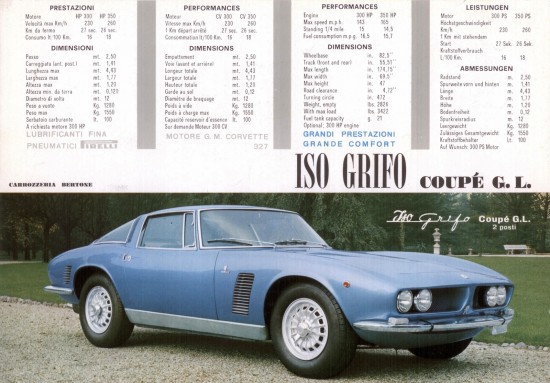
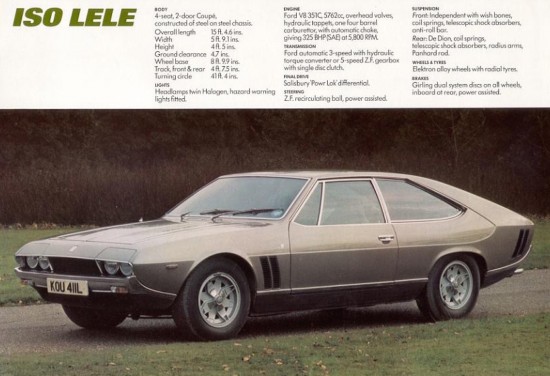
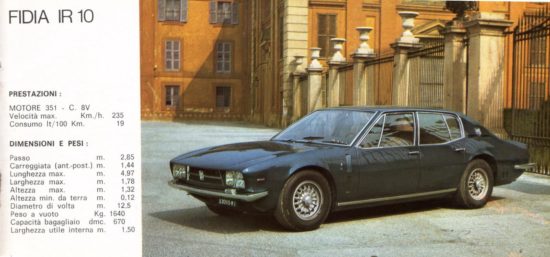
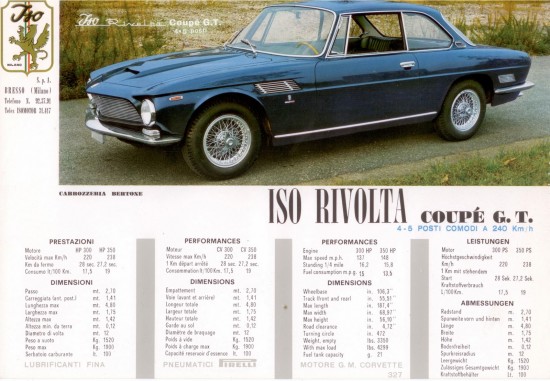
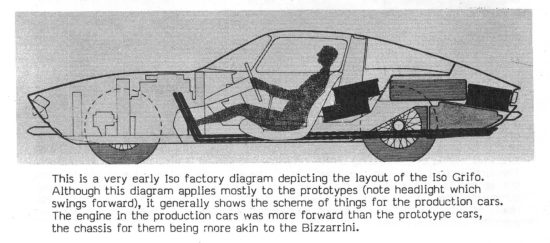
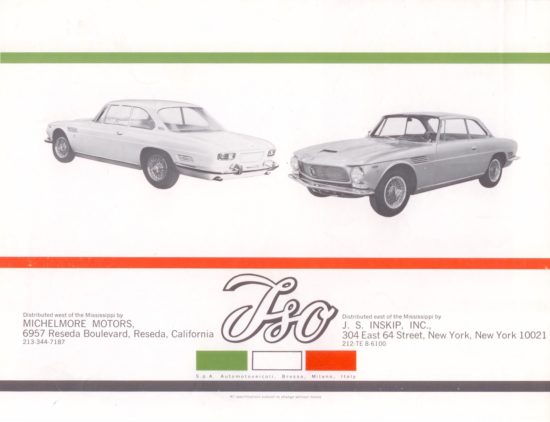
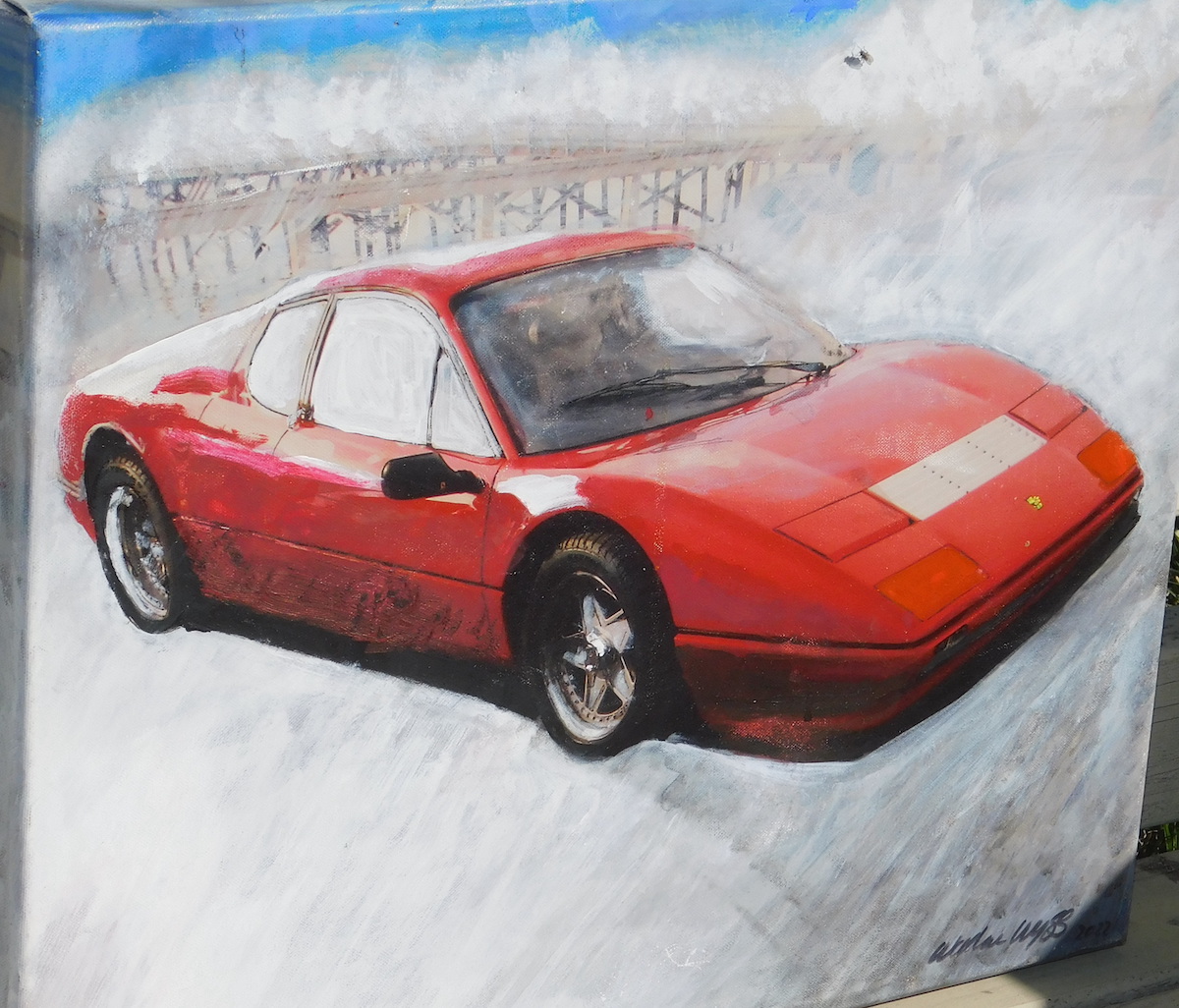

Mike, thanks for posting this fabulous story.
Over the other side of the pond, I had a similar experience around 1985/6 when I purchased my ISO. I had been entranced by low volume sports cars and tangled with Pipers & TVRs, etc. I also had had a succession of Jaguars which I had maintained and semi-restored thinking this made me competent to own something a little more special. So with a budget of £10K or so I went looking for a car. I went through the logical steps of ruling out the Ferrari (expensive mechanicals, dubious build quality, etc), a Lamborghini, (test drives showed that was available in my budget was generally tired, and looking for an expensive engine rebuild), Aston Martins (Superleggera bodywork scares the living b……. out of me), Bristols ( a bit of an old-boys car), Gordon Keeble (lovely, but not nearly as much as an ISO Grifo). I convinced myself that the semi-monocoque construction of the ISO and the GM mechanicals made the ISO a practical proposition.
Around that time Chris Lackner had also bought his fabulous Grifo 7L, and together a small band of us established the UK Iso Biszzarrini owners club.
In hindsight, my love of the ISO has never dwindled. However, these cars are not easy cars to own and restore as they are quite complex and have a remarkably high proprietary content, making the part supply sometimes tricky. If you are used to an Aston or Jag, you will find more problems with the Iso. The plus side is that the cars were designed by experienced engineers who had little need to compromise in their choice of componentry. That makes the fixtures generally good for the period.
I have enjoyed my ISO journey thus far and wouldn’t swap it for any other (well, possibly a couple of even more crazy cars).
Thank you for this Peter.
Maybe you want to share more with My Car Quest readers?
Is Louis still with us? Did he get to see the rapid appreciation of Iso’s some 30 years after this article?
I HAD A RIVOLTA AND CONSIDER IT TO BE ONE OF THE BEST OF THE 100-+ I EVER HAD.
I just spoke with Louis today about the fact that the world’s appreciation for our cars literally flew up but that was never why we chose them as our favorite. He is doing great and still fully immersed in Iso/Bizzarrini.